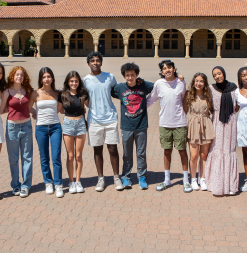Refund Policy
Parent/legal guardian is responsible for paying the full amount of tuition for the Program, less any financial aid awarded. Parent/legal guardian acknowledges that his/her responsibility to pay the full amount of tuition due under this Agreement is unconditional and applies whether or not Student completes the Program. Parent's/legal guardian's failure to pay any amount of tuition when due pursuant to the terms of this Agreement may, at Stanford Pre-Collegiate Studies' sole discretion, result in Student being prevented from participating in the Program.
Parent/legal guardian understands and agrees that, in the event Stanford Pre-Collegiate Studies suspends, dismisses, or otherwise removes Student for any reason, or if Student withdraws voluntarily or involuntarily, parent/legal guardian remains obligated to pay the full amount of tuition and fees due under this Agreement, and the Program will retain all tuition and fees paid by parent/legal guardian. Parent/legal guardian therefore agrees that parent/legal guardian is not entitled to any refund and is obligated to pay Stanford Pre-Collegiate Studies for the full amount of tuition, regardless of whether Student completes the Program, Student is dismissed, or otherwise removed for any of reason, or Student withdraws voluntarily or involuntarily, for all or any portion of the Program as liquidated damages and assumes full responsibility for payment.
Withdrawal Policy
Participant Check-Out Policy
Stanford Humanities Institute and Stanford University Mathematics Camp are designed to provide students with an academically rigorous, college-level experience on Stanford campus. Attending all scheduled program activities, including classes, afternoon and weekend activities, and field trips, is a required part of the program experience.
Academic, Structured Time
Participants may walk to meals, classes, and afternoon structured activities in small groups or pairs. They cannot walk to class alone. Stanford Pre-Collegiate Studies staff conduct a head count at each meal, class, problem-set time, discussion section, afternoon activity, and hall meeting to account for participants and ensure their safety.
Participant Check-Out Policy During Unstructured Time
Participants spend most of their time in required lectures, discussion sessions, problem set sessions, or activities. A few times a week and on some weekends there is unstructured, free time available to participants. During this time, participants may check-out in pairs or groups to go to the campus bookstore, gym, or a cafe, among other options, within the boundaries of the Campus Drive Loop. Check-outs are only permitted during daylight hours.
Check-outs are a privilege afforded to participants. Participants are expected to abide by program policies and procedures when they check out. All check-outs are subject to approval at the discretion of Stanford Pre-Collegiate Studies staff. Failure to follow program policies and procedures may result in the denial of future check-out requests.
Participants agree to abide by the following guidelines and requirements when checking out during unstructured time:
- Participants sign themselves out in pairs or groups during daylight hours when there is unstructured program time. Check-outs cannot interfere with required scheduled program activities. Participants cannot check-out on their own.
- All participants must return to their assigned residence from a checkout prior to sunset.
- Every participant must sign themselves out and include a working phone number where they can be reached. Participants agree to answer texts or calls by staff at this number.
- A participant cannot complete the checkout form on behalf of another participant.
- Participants should provide the intended locations they plan to visit while they are checked out. If participants know they will be back late, they must notify residential staff immediately.
- If a participant does not return within fifteen minutes of their estimated return time, staff will call them. If the participant does not answer, staff will follow incident protocols, including calling the parent or legal guardian and the Stanford Department of Public Safety.
- When participants return from their checkout, they must check back in with residential staff so their return is documented.
- Participants are prohibited from wandering outside of Campus Drive Loop or leaving Stanford campus.
While checked out on campus, participants cannot:
- Ride in any vehicle or ride-share service, including the Marguerite Shuttle.
- Visit or enter another residence hall, even to visit a friend.
- Trespass or enter any unauthorized space on Stanford campus.
- Swim in or go into the water at Lake Lagunita.
- Intentionally interact with non-program Stanford undergraduate students, Stanford graduate students, faculty, or staff, or other adults in accordance with Stanford University’s Protection of Minors policies.
Generative AI Policy
Generative AI is artificial intelligence that can produce various types of content. For example, ChatGPT can write essays and code. SPCS follows Stanford University’s Office of Community Standards policy regarding generative AI, which states:
Individual course instructors are free to set their own policies regulating the use of generative AI tools in their courses, including allowing or disallowing some or all uses of such tools. Course instructors should set such policies in their course syllabi and clearly communicate such policies to students. Students who are unsure of policies regarding generative AI tools are encouraged to ask their instructors for clarification. Students should acknowledge the use of generative AI and default to disclosing the use of assistance when in doubt.
Absent a clear statement from a course instructor, use of or consultation with generative AI shall be treated analogously to assistance from another person. In particular, using generative AI tools to substantially complete an assignment or exam (e.g. by entering exam or assignment questions) is not permitted. Students should acknowledge the use of generative AI (other than incidental use) and default to disclosing such assistance when in doubt.
Participants should exercise caution when using generative AI and refrain from uploading personal information or confidential data to platforms like ChatGPT.
